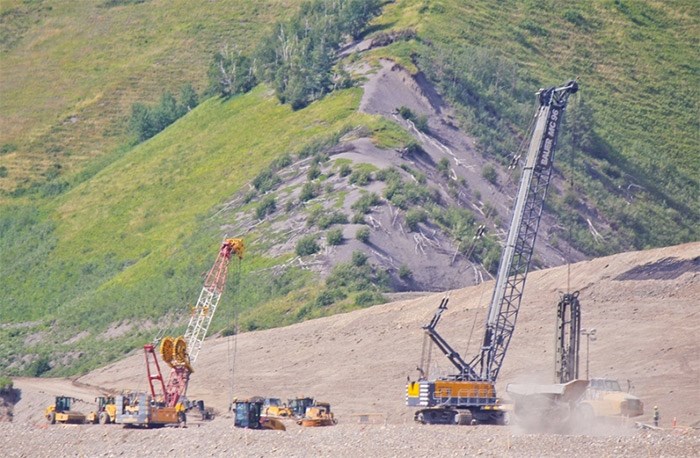 Construction activity at the Site C dam site on July 8, 2017. Photo By Matt Preprost
Construction activity at the Site C dam site on July 8, 2017. Photo By Matt Preprost
Lawsuits launched against Peace River Hydro Partners
A wrongful dismissal suit and civil claim for unpaid work have been launched in B.C. Supreme Court against Site C's main contractor.
Kent Peyton, a former construction manager on the $8.9-billion project, has filed a civil claim against Peace River Hydro Partners alleging he was wrongfully fired after raising concerns about worker safety at the dam site, the Vancouver Sun reports.
In the claim, Peyton alleges in May project officials ordered dangerous work practices to speed up construction at a cofferdam excavation site, which was "significantly behind schedule," according to the Sun.
That included overcrowding and unsafe access roads to a pit where excavators, bulldozers and drills were working in "unsafe proximity to one another," according to the Sun.
Those concerns were brought to officials, however, an altercation followed that resulted in Peyton being banned from the work site, the Sun reports. He was later fired in June.
A response has yet to be filed, according to the Sun. The allegations have not been proven.
Meanwhile, Daski Contracting has filed a civil claim against the partnership alleging it is owed $2.6 million for unpaid work it carried out 2016 and 2017.
The work includes subcontracted labour, materials, and equipment to dewater the project site. Daski is seeking $2.6 million for three outstanding purchase orders as well as court costs for breach of contract, according to the claim.
"In accordance with the purchase orders issued by PRHP to Daski and with applicable construction standards and practice, Daski faithfully and diligently carried out its legal obligations and duly performed the work," the claim reads.
Peace River Hydro Partners disagrees, and argues Daski breached the terms of its contracts.
In its response, the partnership alleges Daski failed to comply with the terms of its purchase orders by employing subcontractors and undertaking work outside the scope of the orders without the partnership's consent, and for charging "inconsistent and unreasonable rates."
The partnership has "suffered loss and damage" from Daski's failure to comply with the terms, it says.
"The purchase orders constituted binding and enforceable contracts," the statement of defence reads.
All project suppliers, including Daski, were advised in November 2016 they would not be paid for goods or services without a formal purchase order, the partnership says. However, "during 2016 and 2017, Daski invoiced PRHP for work that had not been ordered by PRHP pursuant to a purchase order," the partnership says.
"To the extent that Daski performed work not covered by a purchase order, such work was not performed pursuant to a contract with PRHP, and PRHP is not liable to Daski for such work."
The claim has yet to be argued before the courts and the allegations have not been proven.
Final comments pour in
The deadline for final comments on the BC Utilities Commission's preliminary report on Site C closed on Oct. 11.
In its submissions, BC Hydro maintains Site C is the most "cost effective" and "lowest risk" option to meet future provincial power needs, and supports multiple climate change objectives.
"A world in which there is significant switching to low carbon electricity sources would mean that we would need much more clean energy and capacity than could be provided by Site C alone," BC Hydro says.
"Site C is unmatched by any other resource in terms of the firming, shaping and storage benefits the project provides that are key to integrating other intermittent renewable energy sources like solar and wind into BC Hydro’s resource options."
A termination of the project could spark litigation with contractors, the utility says, while ratepayers would pay for 36 per cent of the project "without anything to show for it."
A suspension with the option to resume by 2024 would impact the utility's the ability to deliver the project.
"A complex infrastructure project cannot simply be 'paused' for a number of years and then taken up again without substantial challenges to execution," BC Hydro says.
"At a minimum, the project would be estimated to cost $13.6 billion if suspended for seven years and could be higher."
Meanwhile, former BC Hydro CEO Marc Eliesen has repeated his call to end construction.
He called BC Hydro's claims Site C will finish on time and on budget "illusionary," pointing to cost overruns between 34 to 72 per cent on recent dams built in Manitoba and Newfoundland. Eliesen blasted BC Hydro's accounting practices and load forecasts, and predicted the cost of Site C is likely to rise by 30 per cent to $12 billion if it continues.
"Site C must be cancelled to ensure that the BC ratepayers are not left with an unconscionable burden of significant electricity rate increases that will cause major economic harm to families and businesses throughout the province," he said.
BC Hydro has misrepresented both environmental and geotechnical risks facing the project if it continues, Eliesen said, noting regulators are in a position to levy hefty fines against BC Hydro for defaulting on numerous environmental compliance measures.
Eliesen was particularly critical of BC Hydro and its latest admission that it will miss its 2019 river diversion target because of geotechnical challenges.
"Putting this in context, on October 4, 2017, the commission was told that the probability of geotechnical risks was 10 per cent with a cost range of $10 to $100 million," he said.
"That same day, the commission is informed by (President Chris O'Riley) that BC Hydro has encountered geotechnical and construction challenges—geotechnical risk is no longer probable, it has occurred—and the total cost related to this is $610 million."
Submissions to the commission can be read at www.sitecinquiry.com/submissions-and-comments.
Read more from the Alaska Highway News


